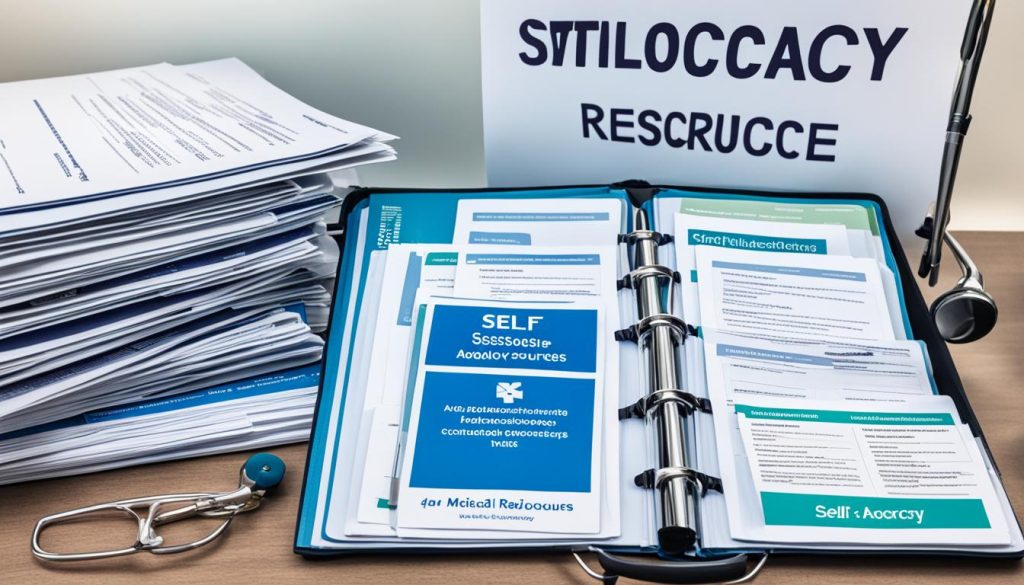As someone who spent a decade loving a woman with endometriosis and fibromyalgia, I have firsthand experience navigating the challenges of being a partner to someone with a chronic illness. Watching my wife endure the daily pain and uncertainty of her conditions shaped me into the man I am today – an advocate for her health and well-being.
Through our journey, I witnessed the importance of self-advocacy in a medical setting. It became evident that being passive was not an option, so I took it upon myself to learn about her conditions, research treatment options, and communicate effectively with healthcare providers. This newfound knowledge and expertise not only helped me support my wife but also empowered me to share my experiences with other men in similar positions.
I started a blog, “The Healthy Partner’s Guide to Self-Advocacy in a Medical Setting,” as a platform to share valuable insights, tips, and resources on navigating the medical system and advocating for your partner’s health. The blog served as a therapeutic outlet for me as I shared my knowledge and experiences, and connected with others facing similar challenges.
Through my blog, I aim to empower partners of individuals with chronic illnesses to become active participants in their loved one’s healthcare journey. I believe that by advocating for their health, we can help create a better understanding of the unique needs and challenges faced by those living with chronic illnesses.
Join me on this journey of self-advocacy, patient empowerment, and healthcare navigation – together, we can make a difference in the lives of our partners and contribute to the new normal with chronic illness by embracing lifestyle adaptations and supporting their overall well-being.
The Importance of Self-Advocacy in Medical Settings
Self-advocacy in a medical setting is crucial for individuals to ensure that their needs and rights are met. By speaking up and being an active participant in your healthcare decisions, you can effectively navigate the medical system and have a sense of control over your own health.
When you engage in self-advocacy, you empower yourself to make informed choices about your treatment options, ask questions, express your concerns, and advocate for yourself. It’s about understanding your rights, responsibilities, and the available resources in a medical setting.
Building a collaborative relationship with your healthcare providers is essential, and self-advocacy enables you to do just that. By actively participating in your healthcare, you become a partner in the decision-making process and promote patient empowerment.
For partners and caregivers, supporting and encouraging self-advocacy in your loved ones with chronic illnesses is equally important. By empowering them to speak up and advocate for their needs, you help them regain control and receive the best possible care.
Remember, self-advocacy is about taking charge of your health and ensuring that your voice is heard throughout your medical journey. It’s a powerful tool that promotes patient empowerment and enhances your overall healthcare experience.

The Benefits of Self-Advocacy in Medical Settings:
- Empowers individuals to make informed decisions about their treatment options
- Allows individuals to ask questions and express their concerns
- Promotes collaborative relationships with healthcare providers
- Enhances patient empowerment and control over one’s health
- Improves overall healthcare experience and satisfaction
Tips for Effective Self-Advocacy in a Medical Setting
When it comes to advocating for your health in a medical setting, there are several tips that can help you become an effective self-advocate. By following these tips, you can assert your rights, communicate your needs, and make informed decisions about your healthcare.
1. Value Yourself and Your Rights
Remember that your thoughts, feelings, and needs are important. Recognize that you have the right to be heard and respected in your healthcare journey. By valuing yourself and your rights, you can approach self-advocacy with confidence and assertiveness.
2. Speak Up and Describe Your Problems
Don’t be afraid to speak up and describe the problems you are facing. Be clear and specific about your symptoms, concerns, and any challenges you may be experiencing. Effective communication is key in ensuring that your healthcare providers understand your needs and can provide appropriate care.
3. Identify Your Needs and Ask for Them
Take the time to identify your needs and wants when it comes to your healthcare. Whether it’s requesting specific treatments, accommodations, or support services, don’t hesitate to ask for what you need. Your voice matters, and expressing your needs is essential in receiving the care that is tailored to you.
4. Express Yourself in a Healthy and Positive Way
Expressing negative thoughts and feelings is a natural part of self-advocacy; however, it’s important to do so in a healthy and positive way. Be assertive but respectful in your communication. Remember that effective self-advocacy involves advocating for yourself without damaging your relationships with healthcare providers.
5. Be Prepared for Appointments
Before each appointment, take the time to prepare. Research your condition, treatment options, and any questions or concerns you may have. Bring a list of topics you want to discuss and any relevant medical records. Being prepared will help you make the most of your time with healthcare providers and ensure that all your needs are addressed.
6. Work Together with Healthcare Providers
View self-advocacy as a collaborative effort between you and your healthcare providers. Foster a partnership that allows for open communication, shared decision-making, and creative problem-solving. Working together will lead to better outcomes and ensure that your healthcare journey is truly patient-centered.
The Role of Self-Advocacy in Chronic Illness Management
Self-advocacy plays a significant role in managing chronic illnesses. Living with a chronic illness can be challenging, and individuals often face unique obstacles in their healthcare journey. By embracing self-advocacy, individuals can actively advocate for their needs and rights, empowering themselves to effectively manage their conditions.
Through self-advocacy, individuals with chronic illnesses can make informed decisions about their treatment and care. They become active participants in their own healthcare, navigating the complexities of the medical system and communicating their needs to healthcare providers. By taking an active role in their care, individuals can ensure that their voices are heard and their concerns are addressed.
Self-advocacy also fosters a collaborative relationship between individuals and healthcare providers. It promotes open and transparent communication, which is vital in managing chronic illnesses. By actively engaging with healthcare professionals, individuals can co-create personalized care plans that address their specific needs and preferences.
Furthermore, self-advocacy empowers individuals and promotes a sense of ownership over their healthcare journey. It allows individuals to reclaim control over their lives and fosters a sense of resilience and determination in the face of challenges.
Partners and caregivers also play a crucial role in supporting and encouraging self-advocacy. By helping individuals navigate the healthcare system, gather relevant information, and serve as a sounding board for concerns and questions, partners can contribute to the overall well-being and empowerment of their loved ones.
Self-advocacy is not just about managing medical appointments and treatments; it encompasses all aspects of living with a chronic illness. It involves adapting to a new normal, making lifestyle changes, and seeking support when needed. By embracing self-advocacy, individuals can strive for a fulfilling life and maintain a sense of independence despite their health challenges.
Lifestyle and Adaptations
Living with a chronic illness often requires individuals to make lifestyle adaptations. This can include managing medication schedules, adopting healthy habits, and incorporating self-care activities into daily routines. By advocating for themselves, individuals can prioritize their health needs and implement necessary lifestyle changes.
Loving a Woman with a Chronic Illness
Partners of individuals with chronic illnesses face their own set of challenges. They must navigate the delicate balance of providing support while allowing their loved ones to advocate for their own needs. By promoting self-advocacy in their relationships, partners can foster a sense of independence, understanding, and collaboration.
The New Normal with Chronic Illness
Chronic illness often requires individuals to reframe their perspective and adjust to a new normal. By embracing self-advocacy, individuals can proactively shape their lives, adapt to changes, and find ways to live fully despite the challenges they face.

| Benefits | Description |
|---|---|
| Increased empowerment | Individuals feel a sense of control and ownership over their healthcare journey. |
| Better communication | Open and transparent communication with healthcare providers leads to personalized care and improved outcomes. |
| Improved treatment adherence | By actively participating in their care, individuals are more likely to adhere to treatment plans. |
| Enhanced quality of life | Self-advocacy allows individuals to prioritize their needs, make necessary lifestyle adaptations, and find support when needed. |
| Stronger partnerships | Partners and caregivers play a crucial role in supporting self-advocacy and fostering collaboration in healthcare decision-making. |
Resources for Self-Advocacy in a Medical Setting
When it comes to self-advocacy in a medical setting, having access to the right resources can make all the difference. Whether you’re navigating a new diagnosis or managing an ongoing medical condition, these resources can empower you to advocate for yourself effectively. Here are some valuable sources of support and information:
- Self-Advocacy Websites: Explore online platforms dedicated to self-advocacy, where you can find groups, personal stories, guidance, and videos. These resources can provide valuable insights and inspiration for your own self-advocacy journey.
- Organizations and Centers: Look for organizations and centers that specialize in self-advocacy. They offer training, information, and advocacy services specifically designed for individuals with disabilities and chronic illnesses. These resources can equip you with the knowledge and tools you need to navigate the medical system confidently.
- Parent Centers: If you’re a parent of a child with a disability, Parent Centers in each state offer valuable support and resources. They provide information on navigating special education services, transitioning to adulthood, and managing healthcare needs. These resources can help you advocate for your child’s health and well-being.
- National Organizations for Disability Rights and Patient Advocacy: National organizations focused on disability rights and patient advocacy offer a wealth of resources. From fact sheets and webinars to policy information, these organizations provide valuable insights into the healthcare system and empower you to advocate for your rights effectively.
- Web-Based Interventions and Educational Programs: Take advantage of web-based interventions and educational programs specifically designed to enhance self-advocacy skills. These interactive resources provide practical tools, strategies, and support to help you navigate the complexities of the medical system.
Remember, self-advocacy is a journey, and these resources are here to support you every step of the way. By accessing these valuable sources of information and support, you can become a stronger advocate for your health and well-being in a medical setting.

The Impact of Self-Advocacy on Health Outcomes
Research has shown that self-advocacy can have a positive impact on health outcomes. When you actively participate in your healthcare decisions and effectively communicate with your healthcare providers, several benefits can be seen. Better patient satisfaction, improved quality of care, and increased adherence to treatment plans are just a few of the positive outcomes associated with self-advocacy. By embracing a patient-centered approach to care, where you play an active role in decision-making, you can experience better health outcomes and a greater sense of empowerment.
Self-advocacy also contributes to better self-management of chronic conditions and overall well-being. By expressing your needs and concerns, receiving appropriate care, and having a sense of control and empowerment in your healthcare journey, you can positively impact your health. By taking an active role in advocating for yourself, you contribute to improving the quality of your healthcare experiences and outcomes.

The Benefits of Self-Advocacy in Health Outcomes:
- Improved patient satisfaction
- Enhanced quality of care
- Increased adherence to treatment plans
- Better self-management of chronic conditions
- Improved overall well-being
- Greater sense of empowerment
When you advocate for yourself in a medical setting, you are actively participating in your own healthcare decisions. This empowers you to express your needs, receive appropriate care, and ultimately improve your health outcomes. Remember, your voice matters, and by advocating for yourself, you can make a significant impact on your health and well-being.
Overcoming Barriers to Self-Advocacy in a Medical Setting
While self-advocacy is crucial in a medical setting, individuals may face barriers that hinder their ability to advocate for themselves effectively. Identifying and addressing these barriers is essential to ensure patient empowerment and improve healthcare experiences. Here are some common barriers and strategies to overcome them:
Lack of Knowledge or Information
Many individuals may not be aware of their rights or understand how to navigate the healthcare system. Without this knowledge, they may feel unsure about speaking up or advocating for themselves. It is important to provide individuals with information about their rights and available resources, empowering them to make informed decisions about their healthcare.
Intimidation by Healthcare Providers
Feeling intimidated by healthcare providers can make self-advocacy challenging. Encouraging open and honest communication is crucial in building a collaborative relationship between individuals and their healthcare providers. By fostering a supportive environment, individuals can feel more comfortable expressing their needs and concerns.
Inadequate Communication Skills
Effective communication is key to self-advocacy. Some individuals may struggle with expressing their thoughts and concerns clearly. Providing resources and workshops on communication skills can help individuals develop the confidence and tools necessary to effectively communicate their needs and preferences to healthcare providers.
Powerlessness or Dependency
Individuals may feel a sense of powerlessness or dependency on others when it comes to their healthcare. Encouraging self-advocacy fosters a sense of independence and empowerment. By acknowledging and validating their experiences, individuals can build the confidence to advocate for themselves and take an active role in their healthcare decisions.
Promoting Patient-Centered Care
Creating a patient-centered care environment is crucial in supporting self-advocacy. Healthcare providers should actively involve individuals in their care, listen to their concerns, and respect their decision-making autonomy. This collaborative approach encourages individuals to take an active role in their healthcare and promotes a sense of empowerment.
| Common Barriers | Strategies to Overcome |
|---|---|
| Lack of Knowledge or Information | Provide educational resources on rights and available resources |
| Intimidation by Healthcare Providers | Foster a supportive and collaborative relationship |
| Inadequate Communication Skills | Offer communication skills workshops and resources |
| Powerlessness or Dependency | Promote a sense of independence and empowerment |
| Promoting Patient-Centered Care | Involve individuals in their care and respect their decision-making autonomy |
The Role of Partners in Supporting Self-Advocacy
Partners play a crucial role in supporting and encouraging self-advocacy in a medical setting. By understanding the importance of self-advocacy and the unique challenges faced by individuals with chronic illnesses, partners can provide invaluable assistance throughout the healthcare journey.
Emotional support is a key aspect of the partner’s role. Lovingly being there for your partner, offering encouragement and reassurance, can help them navigate the complexities and uncertainties of the medical system. By providing a safe and understanding space, you can empower your loved one to express their fears, concerns, and needs.
In addition to emotional support, partners can also offer practical assistance. Actively participating in healthcare appointments alongside your partner demonstrates solidarity and reinforces the importance of their self-advocacy. Taking notes, asking questions, and advocating for their needs can ensure that important information is recorded and addressed.
Partner involvement extends beyond appointments. By assisting in understanding rights and researching treatment options, you can equip your loved one with the knowledge necessary for effective self-advocacy. Expressing concerns and raising relevant questions with healthcare providers on their behalf can help ensure that their voice is heard and their needs are met.
Building a strong partnership based on trust, communication, and mutual support is essential in empowering individuals to advocate for their health. By collaborating as a team, both you and your partner can navigate the medical system together and work towards improved health outcomes.
The Impact of Self-Advocacy on Mental Health in Chronic Illness
Living with a chronic illness can take a toll on your mental health. The daily challenges, uncertainties, and limitations can leave you feeling overwhelmed, anxious, and depressed. However, there is a powerful tool that can help you regain control and promote your mental well-being: self-advocacy.
By actively participating in your healthcare journey and advocating for your needs, you can find a renewed sense of empowerment. Self-advocacy allows you to express your feelings and concerns, access appropriate care and support, and make choices that align with your values and preferences. It gives you a voice in your own healthcare and allows you to take charge of your mental well-being.
For partners of individuals with chronic illnesses, supporting and encouraging self-advocacy can also have a positive impact on their own mental health. By fostering a sense of purpose, involvement, and connection in the healthcare journey, partners can find solace and a means to navigate the challenges of being a caregiver and supportive loved one.
Remember, self-advocacy is not just about medical decisions; it is about advocating for your mental well-being as well. Embrace your power to speak up, seek the support you need, and make choices that prioritize your mental health. You have the ability to shape your own journey and find a sense of peace and resilience in the face of chronic illness.
